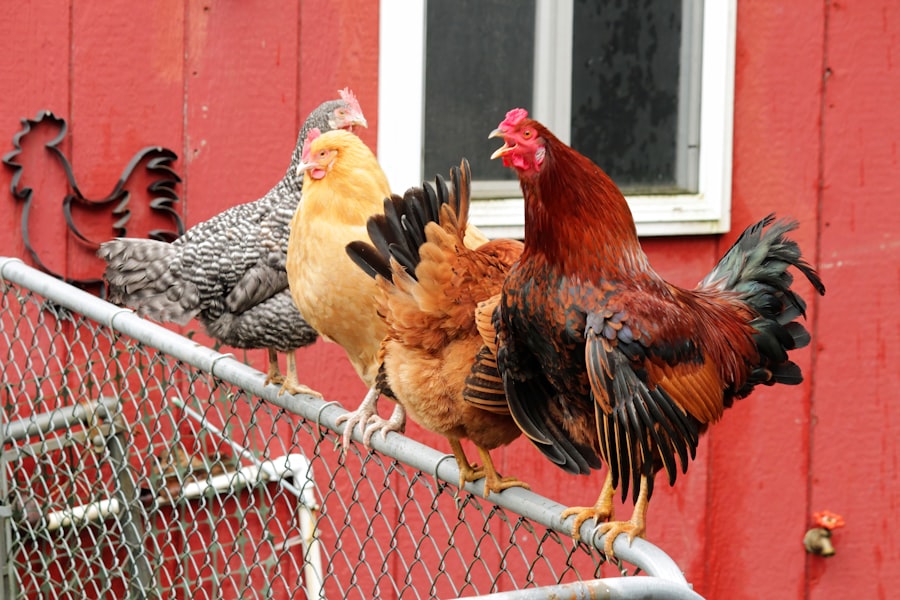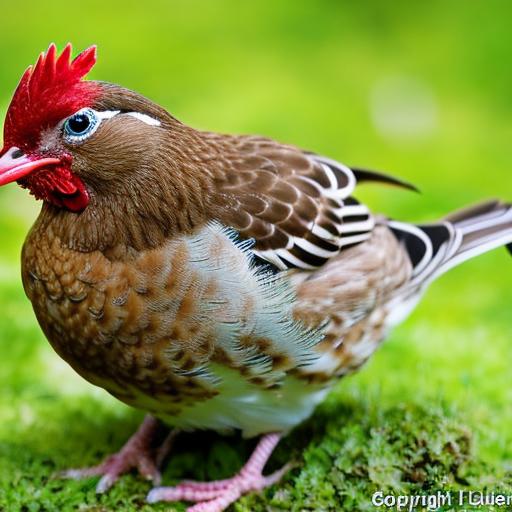Keeping chickens in your garden has become a growing trend in recent years, especially in urban areas. It offers a range of benefits, from providing fresh eggs to having chickens as pets. Additionally, chicken manure can be used as fertilizer for your garden. However, there are legal considerations to keep in mind before starting your own flock. In this article, we will explore the benefits of keeping chickens in your garden, the legal considerations, choosing the right chicken breed, designing and building a chicken coop, maintaining a clean and healthy coop, feeding and watering your chickens, protecting them from predators, and harvesting fresh eggs.
Key Takeaways
- Keeping chickens in your garden can provide numerous benefits, including fresh eggs, natural pest control, and fertilizer for your plants.
- Before keeping chickens, it’s important to research and comply with local laws and regulations regarding backyard poultry.
- Choosing the right chicken breed for your garden depends on factors such as egg production, temperament, and climate adaptability.
- Designing and building a chicken coop requires consideration of factors such as size, ventilation, and predator protection.
- Maintaining a clean and healthy chicken coop involves regular cleaning, proper ventilation, and providing adequate space and nesting boxes for your chickens.
Benefits of Keeping Chickens in Your Garden
One of the main benefits of keeping chickens in your garden is having a constant supply of fresh eggs. There is nothing quite like collecting eggs from your own backyard and knowing exactly where they came from. Fresh eggs have a richer taste and vibrant yolks compared to store-bought eggs. They are also higher in nutrients such as omega-3 fatty acids and vitamin E.
Chickens can also make great pets. They are social animals that can be trained to come when called and even sit on your lap for a cuddle. They have unique personalities and can provide endless entertainment with their antics. Chickens are also relatively low maintenance compared to other pets, making them a great choice for families or individuals who want the companionship without the added responsibility.
Another benefit of keeping chickens in your garden is the opportunity to use their manure as fertilizer. Chicken manure is high in nitrogen, phosphorus, and potassium, making it an excellent natural fertilizer for your plants. It can improve soil structure, promote healthy root growth, and increase overall plant productivity. By keeping chickens in your garden, you can create a sustainable cycle where they provide you with fresh eggs while their manure nourishes your plants.
Legal Considerations for Keeping Chickens
Before starting your own flock, it is important to research and understand the legal considerations of keeping chickens in your area. Some cities or neighborhoods have specific regulations or restrictions on keeping chickens, such as the number of chickens allowed, coop size, and distance from neighboring properties. It is crucial to check with your local government or homeowner’s association to ensure you are in compliance with any regulations.
In addition to regulations, some areas may require permits or licenses for keeping chickens. These permits may involve inspections of your coop and property to ensure it meets certain standards for the health and safety of the chickens and surrounding community. It is important to familiarize yourself with any permit requirements and obtain them before bringing chickens into your garden.
Choosing the Right Chicken Breed for Your Garden
When choosing the right chicken breed for your garden, it is important to consider their characteristics and purpose. Some breeds are better suited for egg-laying, while others are bred for meat production. There are also dual-purpose breeds that can provide both eggs and meat.
For those primarily interested in fresh eggs, breeds such as Rhode Island Reds, Leghorns, and Sussex are known for their high egg production. These breeds are reliable layers and can provide a steady supply of eggs throughout the year. If you are looking for a breed that is more docile and friendly, consider Orpingtons or Silkies. These breeds are known for their calm temperament and make great pets.
If you are interested in raising chickens for meat production, there are specific meat breeds such as Cornish Cross or Freedom Rangers that grow quickly and have good meat quality. These breeds are typically raised for a shorter period of time before being processed for meat.
Designing and Building a Chicken Coop
Designing and building a chicken coop is an important aspect of keeping chickens in your garden. The coop should provide a safe and comfortable environment for your chickens while also being functional and aesthetically pleasing.
There are different types of chicken coops to choose from, including traditional coops, mobile coops, and chicken tractors. Traditional coops are stationary structures that provide a permanent home for your chickens. Mobile coops, also known as chicken tractors, are designed to be moved around your garden, allowing your chickens to graze on fresh grass and insects while still being protected. The choice of coop will depend on your specific needs and preferences.
When building a chicken coop, it is important to use sturdy materials that can withstand the elements and protect your chickens from predators. Common materials used for coop construction include wood, wire mesh, and metal roofing. The coop should have proper ventilation to prevent moisture buildup and ensure good air circulation. It should also have nesting boxes for the chickens to lay their eggs and roosting bars for them to perch on at night.
Maintaining a Clean and Healthy Chicken Coop

Maintaining a clean and healthy chicken coop is essential for the well-being of your chickens and the prevention of diseases. Regular cleaning helps remove waste, parasites, and bacteria that can harm your chickens.
It is important to clean the coop at least once a week, removing any soiled bedding, droppings, and uneaten food. Replace the bedding with fresh material such as straw or wood shavings. The coop should also be thoroughly cleaned and disinfected periodically to prevent the buildup of harmful bacteria.
In addition to regular cleaning, it is important to provide proper ventilation in the coop to prevent moisture buildup. Good airflow helps reduce the risk of respiratory diseases in chickens. Make sure there are windows or vents in the coop that can be opened or closed depending on the weather conditions.
Feeding and Watering Your Chickens
Feeding your chickens a balanced diet is crucial for their health and egg production. There are different types of chicken feed available, including pellets, crumbles, and mash. These feeds are formulated to provide the necessary nutrients for chickens at different stages of life.
In addition to commercial feed, chickens also enjoy foraging for insects, worms, and greens. Allowing your chickens to free-range in your garden can provide them with additional nutrition and entertainment. However, it is important to supervise them to prevent them from damaging your plants or escaping from the garden.
Fresh water is also essential for your chickens. Make sure they have access to clean water at all times. Provide waterers that are easy to clean and refill. In colder climates, consider using heated waterers to prevent freezing during winter months.
Protecting Your Chickens from Predators
Protecting your chickens from predators is crucial to their safety and well-being. There are various types of predators that may target your chickens, including raccoons, foxes, coyotes, and even neighborhood dogs or cats.
To protect your chickens, it is important to secure the coop and run with sturdy fencing that is buried at least a foot underground to prevent predators from digging under. Use hardware cloth or wire mesh with small openings to prevent predators from squeezing through. Make sure all doors and windows are securely closed at night.
Consider installing motion-activated lights or alarms near the coop to deter predators. You can also use scare tactics such as fake owls or noise-making devices to keep predators away.
Harvesting Fresh Eggs from Your Chickens
Harvesting fresh eggs from your chickens is one of the most rewarding aspects of keeping them in your garden. To collect eggs, check the nesting boxes daily and remove any eggs that have been laid. It is important to handle the eggs gently to avoid cracking or damaging them.
Fresh eggs can be stored at room temperature for up to a week or in the refrigerator for several weeks. To determine if an egg is still fresh, you can perform a simple float test. Fill a bowl with water and gently place the egg in the water. If the egg sinks to the bottom and lays flat, it is fresh. If it stands upright or floats, it is no longer fresh and should be discarded.
Fresh eggs can be used in a variety of recipes, from omelets and quiches to cakes and cookies. They have a richer taste and vibrant yolks compared to store-bought eggs, making them a favorite among home cooks and bakers.
Is Keeping Chickens in Your Garden Right for You?
Keeping chickens in your garden offers a range of benefits, from providing fresh eggs to having chickens as pets. It also allows you to create a sustainable cycle where chicken manure can be used as fertilizer for your garden. However, there are legal considerations to keep in mind before starting your own flock.
Choosing the right chicken breed, designing and building a chicken coop, maintaining a clean and healthy coop, feeding and watering your chickens, protecting them from predators, and harvesting fresh eggs are all important aspects of keeping chickens in your garden.
Before deciding if keeping chickens is right for you, consider the time, effort, and resources required to care for them. Chickens require daily care, including feeding, watering, cleaning, and monitoring their health. They also require a safe and secure environment to protect them from predators.
If you are willing to put in the time and effort, keeping chickens in your garden can be a rewarding experience that provides fresh eggs, companionship, and a connection to nature.
If you’re considering keeping chickens in your garden, you may be wondering about the best way to provide them with a comfortable and spacious living environment. Look no further than this article on large chicken coop ideas from Poultry Wizard. Whether you have limited space or a sprawling garden, this article offers creative and practical solutions for housing your feathered friends. From innovative designs to tips on maximizing space, you’ll find everything you need to create a coop that meets your chickens’ needs. Check out the article here for inspiration and guidance on creating the perfect home for your chickens.
FAQs
What are the benefits of keeping chickens in my garden?
Keeping chickens in your garden can provide you with fresh eggs, natural pest control, and fertilizer for your garden. They also make great pets and can be a fun addition to your backyard.
How much space do chickens need in a garden?
Chickens need at least 4 square feet of space per bird in their coop and at least 10 square feet of outdoor space per bird to roam and forage. It’s important to make sure they have enough space to move around comfortably.
What kind of coop do I need for my chickens?
Your coop should be secure, dry, and well-ventilated. It should also have nesting boxes for your chickens to lay their eggs and perches for them to roost on at night. You can either buy a pre-made coop or build one yourself.
What do chickens eat?
Chickens eat a variety of foods, including chicken feed, grains, fruits, vegetables, and insects. It’s important to provide them with a balanced diet and fresh water at all times.
Do I need a permit to keep chickens in my garden?
The regulations for keeping chickens in your garden vary depending on where you live. Some cities and towns require permits or have specific rules about the number of chickens you can keep. It’s important to check with your local government before getting chickens.
What are some common health issues that chickens can have?
Chickens can be susceptible to a variety of health issues, including respiratory infections, mites and lice, and egg-laying problems. It’s important to keep their coop clean and provide them with proper nutrition and veterinary care if needed.
Can chickens be noisy?
Chickens can be noisy, especially when they are laying eggs or if they feel threatened. However, some breeds are quieter than others. It’s important to check with your neighbors before getting chickens to make sure they are okay with the potential noise.
Meet Walter, the feathered-friend fanatic of Florida! Nestled in the sunshine state, Walter struts through life with his feathered companions, clucking his way to happiness. With a coop that’s fancier than a five-star hotel, he’s the Don Juan of the chicken world. When he’s not teaching his hens to do the cha-cha, you’ll find him in a heated debate with his prized rooster, Sir Clucks-a-Lot. Walter’s poultry passion is no yolk; he’s the sunny-side-up guy you never knew you needed in your flock of friends!







